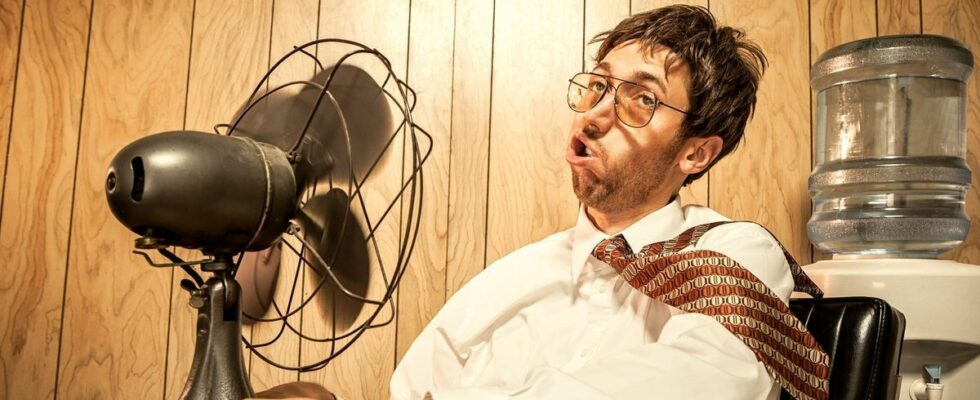Published on
Updated
Reading 3 min.
After a gloomy start to the summer, temperatures are rising across the whole of France. This heatwave is a pleasure for holidaymakers, but not for workers. Indeed, it is not always easy to work when the mercury is soaring. A quick reminder of employees’ rights when it is very hot.
Sweating, headaches, dizziness, dehydration, fatigue… Summer often puts employees to the test and increases the risk of accidents in the workplace. This is why employers have a number of obligations towards their teams in the event of extreme heat. In particular, they are required to provide them with sufficient quantities of fresh drinking water and to renew the air in closed work areas, whether using air conditioners, fans, misters or blinds.
On the other hand, they are free to manage their use as they see fit. They just have to remain vigilant about the temperature and air circulation in the offices. As a reminder, Decree No. 2007-363 of March 19, 2007 requires companies not to lower the air conditioning temperature below 26 degrees due to excessive energy consumption. So there’s no point in forcing your boss to turn the air conditioning on full blast. In addition to being refused, you risk attracting the wrath of your most eco-friendly colleagues.
Generally speaking, employers must take all necessary preventive measures to ensure the safety and health of their employees. This is their only formal obligation. However, the Ministry of Labor encourages them, if possible, to adjust schedules (arriving and leaving earlier) and working conditions (teleworking, additional and/or longer breaks). However, these are recommendations and not obligations.
Shorts at the office: good or bad idea?
In fact, nothing forces your boss to grant you telework, especially if your position is incompatible with this mode of organization. This is a case-by-case matter and a matter of negotiation with your manager. However, if you feel that you are in “serious and imminent danger to [votre] life or [votre] health”, you can exercise a right of withdrawal under Article L4131-1 of the Labor Code. However, it is important to note that extreme heat does not necessarily constitute a valid reason for withdrawal; you should therefore proceed with caution if you want to invoke it. Be aware that the National Institute for Research and Safety for the Prevention of Accidents at Work and Occupational Diseases (INRS) considers that working above 28 degrees presents health risks if the professional activity is physical, and above 30 degrees if it is sedentary.
For those who cannot work from home, they will have to endure the summer heat peaks. This of course concerns employees who work outside such as gardeners, farmers, building maintenance and upkeep workers and construction workers. The latter are particularly exposed to heat-related risks and therefore benefit from specific measures. Their employers must provide them with at least three litres of fresh drinking water per day and per employee, a place to rest suitable for high temperatures and ensure that their personal protective equipment and work clothing are compatible with high temperatures. If necessary, they must adjust or adapt workers’ schedules, or even decide to stop work.
Whether at work or at home, extreme temperatures make you want to dress lightly. But it’s hard to know if your boss will look favorably on you arriving at the office in shorts, a shirt and flip-flops, or if he might take your summer outfit as a sign of “quiet quitting”. French law stipulates that clothing is an individual freedom. In detail, Article L 1121-1 of the Labor Code states that “no one may impose restrictions on the rights of individuals and individual and collective freedoms that are not justified by the nature of the task to be performed or proportionate to the desired goal”. Thus, only a few professions are likely to be required to wear professional attire; most workers are free to dress as they please. However, be sure to opt for loose, flowing cuts, materials such as linen and hemp, and colors such as white, yellow, and red (yes, really) to spend a cool day without sacrificing your style.

